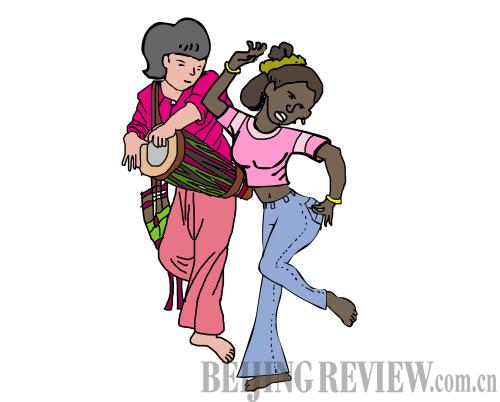|
 |
|
(LI SHIGONG) |
When I arrived in Beijing four years ago, it was not an easy transition. Starting from restaurants to language class disappointments, to irritation with the feeling of millions of eyes on my dreadlocks, I felt it was taking centuries to feel like a resident. The sense of being a stranger was constant.
I decided to adapt. I came up with a plan, but ultimately met with failure. I needed to reevaluate it, but what else could I do? I didn't have a clue until winter arrived.
It was a cold day. My friend and I entered a store pretending to be interested in shopping but really we just wanted the store's heat. To our surprise, the very well known South African song Vulindlela by Brenda Fassie was playing; I started dancing. I couldn't help it. When the song finished I realized the shop assistants were staring at me, and I sensed they were waiting for more, but a Chinese song followed. How do I dance to that? I didn't know. Meanwhile an assistant said in Chinese that I danced very well.
Her words made me happy. She had not approached me as a foreigner; she talked to me as she would talk to her Chinese friends. Then I thought, what would she say if I had danced to the Chinese song? How would I feel if I could dance to the Chinese song?
I would learn Chinese dance, I decided, and shared this with my African friend. He reminded me there is a Zambian proverb that says "if you are ugly, learn how to dance" and I replied with another African proverb, "A tree that refuses to dance will be made to do so by the wind." I searched until I found classes.
My first Chinese dance classes were awful. I was very conscious of my awkward steps and movements. My dance teacher and colleagues didn't think so, because of their belief that Africans are ready to dance. The ability was just not there. In those first classes my dance cells were frozen and needed to be shaken.
Still not discouraged, I was hoping the rhythmic wind would take care of my stubborn body on those twisting arms, shoulders and waist from Uygur minority dance. Then I was encouraged by my teacher's words based on her thinking that any style of dance was easy for an African. While she was testing me, I was following the song, repeating her movements. I counted how many steps to the left and right when she was instructing in northeast China's folk dance. I recalled the numbers I learned in language classes. While she was faithfully passing on the techniques of the Mongolian minority dance I was having fun, having a break from the tough language classes. While she was focused on coordinating my head, hands and hips from Dai minority dance, the copy of peacocks' movements was perfect to ease the tension in my back. While she was presenting the difficulties of coordination technique to me, all these different dance movements brought something about Chinese people, their ways of living, beliefs, understanding of the natural world, and other features. Every time I had something to reflect about.
Several classes passed. Despite our dissimilar aims, we both were on the same track. Dancing—for her a way of showing her culture, and for me to find a way of entering and picking up on parts of the country's cultures—eventually helped me to understand parts of China's culture, which slowly led to an awareness of things beyond the observable, and consequently made me feel more integrated.
It is important to be patient throughout one's adjustment with a new culture, because it is as relevant as our ability to identify a starting point to guide us into learning about different people's ways of life. To me, dance was the wind that led me into the feeling of integration.
Learn about a cultural aspect of China. It will lead you to others, and then you will understand better. What matters is the willingness to get as much as you can from the experience, and the readiness to update concepts and discover ways to settle into a new environment. Once there, have fun and make friends.
The author is an African living in Beijing | 